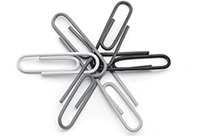
4
CALL PEOPLE BY THEIR NAMES
Ignite Attention and Recognize Individuality
I am not a number—I am a free man!
—PATRICK MCGOOHAN as Number Six, The Prisoner
Hearing your own name is a neural ignition key, activating attention and engaging you in the interaction to follow. Names acknowledge existence, provide an identity, and are a passport to services and opportunities. Denying a person his or her name withers humanity. The importance of having a name is so significant that it is delineated as a fundamental right in South Africa’s post-Apartheid constitution. Being named confers dignity and shines a light on us uniquely (if only for a brief moment). Learning the names of people at work demonstrates respect and confirms that they have been noticed and are valued as people. If you want to connect first, start by calling people by their names!
In many offices, everyone knows the boss’s name but those down the ranks don’t enjoy the same level of recognition, particularly support staff working in areas such as maintenance, dining facilities, and, ironically, receptionists—the very people responsible for knowing and announcing visitors’ names. Personnel from foreign backgrounds (no matter their seniority) are diminished and reminded of their difference when their given names are modified to align with the phonetic limitations of their colleagues. As Dale Carnegie observed, “A person’s name is the sweetest sound in any language.”
While working in Beijing, an American client asked my colleague Zhanna if he could call her Natasha because she’s Russian and it would be easier for him to remember. To knowingly misremember a name, especially when working in cross-cultural settings, privileges one group’s comfort over another’s. To learn a name, to truly recognize who’s around you, you must invest some intellectual capital. Not caring enough to ask or remember a name is an insidious slight that might not be meant maliciously but nevertheless can inflict insult and lead to interpersonal chasms.
THIS IS FOR YOU IF
• You appreciate the importance of making an immediate personal connection.
• There are lots of people who make your day more efficient, pleasant, or fun and yet . . . you refer to them as the “tall one” and the “guy with red glasses” because you don’t know their names.
• There are lots of staff changes and everyone’s looking a bit lost.
• You want to convey respect and dignity.
TAKE ACTION
![]() Get up from your desk now and walk for five minutes around the office. Do you know everyone’s name? Now’s a good time to ask.
Get up from your desk now and walk for five minutes around the office. Do you know everyone’s name? Now’s a good time to ask.
![]() When introducing yourself, ask for the other person’s name. Always.
When introducing yourself, ask for the other person’s name. Always.
![]() Make sure people know each other’s names, whether in a meeting or walking a factory floor. When in doubt, make introductions.
Make sure people know each other’s names, whether in a meeting or walking a factory floor. When in doubt, make introductions.
![]() Try scribbling down names in a meeting according to where everyone is seated—it aids recall.
Try scribbling down names in a meeting according to where everyone is seated—it aids recall.
![]() Ask your colleague to share any history attached to a name; it will help you remember while providing a peek into his or her family story.
Ask your colleague to share any history attached to a name; it will help you remember while providing a peek into his or her family story.
![]() Create contact cards on your phone for the people who provide services for you at work, include the cleaning crew and parking attendants. Until you get these names memorized, put a prompt in your phone that flashes as you are about to enter the office building at the start of the day.
Create contact cards on your phone for the people who provide services for you at work, include the cleaning crew and parking attendants. Until you get these names memorized, put a prompt in your phone that flashes as you are about to enter the office building at the start of the day.
![]() Sometimes a name is exotic for your ear. Enter the phonetic pronunciation into the person’s contact card so you can say the name properly.
Sometimes a name is exotic for your ear. Enter the phonetic pronunciation into the person’s contact card so you can say the name properly.
![]() Make an effort—don’t institutionalize a nickname because it makes your life easier. Everyone has the right to a dignified name in the office.
Make an effort—don’t institutionalize a nickname because it makes your life easier. Everyone has the right to a dignified name in the office.
KEEP IN MIND
• There is no way to fake it. You either know a person’s name or you don’t, and at certain moments this knowledge will be invaluable. If you forget, apologize and ask to be reminded. You might want to describe when you met last, “I recall we had a lovely discussion about the sculpture in the lobby, but I’m afraid I don’t remember your name.”
• No matter how jovial (or harmless you think you are), terms of endearment like “sweetie,” “honey,” and “love” are not appropriate for the workplace and should not be used in lieu of a person’s given name.
• To avoid adverse reactions, remember that tone is important. You don’t want to suggest that you are asking for a name in order to report someone.
